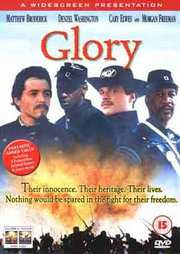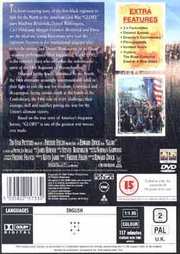Review of Glory
Introduction
A noble and sincere evocation of the horror and heroism of the Civil War, evocatively centred with the 54th Massachusetts Volunteers, the first black regiment of the Union. Matthew Broderick plays their idealistic yet weary commander, Robert Shaw. What it lacks in subtlety and genuine complexity, ‘Glory’ more than makes up for in concise storytelling, passionate vigour, and a genuinely moving depiction of often harrowing realities, a million miles away from ‘Gettysburg’ (1993) or ‘The Red Badge of Courage’ (1951). ‘Glory’s titular reward comes at a much higher price than the simplistic, demagogic moral statements of earlier Civil War dramas. Although less intimately staged than the recent ‘Ride With the Devil’, ‘Glory’ is none the less a patient and lingering endeavour.
Video
For an older picture, ‘Glory’s transfer is surprisingly crisp and lacking in blemishes. Further proof (if it were needed) that DVD is the perfect format to reinvigorate forgotten classics and worn out prints.
Audio
An excellent 5.1 Dolby track which perfectly facilitates the hefty cacophony of the brutal battle scenes and the ambient hustle and bustle of a Civil War camp.
Features
A pleasant surprise, a generally ignored film with buoyant and insightful extras. We get three documentaries, the most enlightening being ‘The True Story of Glory Continues’ which documents the true life tales of the 54th during the war, narrated by Morgan Freeman, it provides excellent context for viewing the film (although it is liable to give away the ending). The other two documentaries feature interviews with Broderick, Freeman and Zwick (whose contributions are identical to those on the commentary track). We get a couple of deleted scenes, both arresting little sequences that inexplicably missed the final cut. There is also the rudimentary filmographies and trailers (not for Glory incidentally, but for the Washington starring vehicles ‘The Bone Collector’ and ‘Devil in a Blue Dress’). There is an astute commentary track from director Zwick, but best of all is the isolated audio track which highlights James Horner’s score. Horner so often turns his overripe compositions into melodramatic excess (‘Titanic’, ‘Braveheart’) but here his vivid and imaginative score plays the emotional cues of the story with breathless simplicity and a disquieting, elegiac beauty.
Conclusion
Although seen from the point of view of the white officer in charge (Broderick) the film’s true interests (and thematic resonance) resides in the black recruits under his command: Morgan Freeman as a courageous, near patriarchal figure of dignity and self respect; Denzel Washington as an arrogant, self-centred dissenter with attitude to spare and Andre Braugher as a learned freed slave to whom the cry of war is more wake up call than call to arms. Although the film often proceeds with a stuttering lack of grace, individual scenes resonate long after the credits have rolled. Director Edward Zwick, working with minimal resources delivers a series of knock-out battle scenes that engender a feeling of genuine fear and futility.
It is however, the curiously ambiguous climax that leaves ‘Glory’ haunting the memory long after the screen has faded to black. Facing insurmountable odds, Shaw and his men march into battle, knowing their death is near. Its a suicidal march into the end, accompanied by James Horner’s harmonic, expressionistic score which radiates an almost divine power and the main themes of leadership, kinship, race, freedom and duty are vividly evoked. The final shot, hinting at Platonic notions of peace and reconciliation only after death is both profoundly bleak and strangely uplifting, both illuminating and contradicting the otherwise generally conventional theist tone. A memorable paradox that merely adds to the startling cumulative effect of this powerful if flawed film.


































Your Opinions and Comments
Be the first to post a comment!